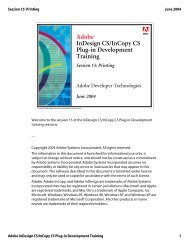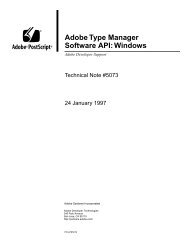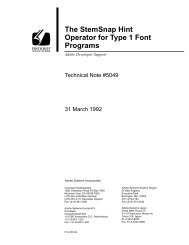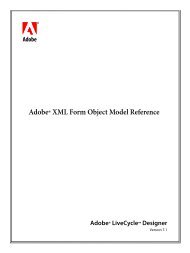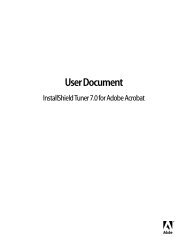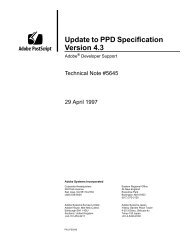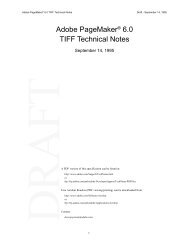Extensible Metadata Platform (XMP) Specification - Adobe Partners
Extensible Metadata Platform (XMP) Specification - Adobe Partners
Extensible Metadata Platform (XMP) Specification - Adobe Partners
Create successful ePaper yourself
Turn your PDF publications into a flip-book with our unique Google optimized e-Paper software.
1<br />
Introduction<br />
What <strong>XMP</strong> Does Not Cover<br />
● Schemas: Predefined sets of metadata property definitions that are relevant for a wide range<br />
of applications, including all of <strong>Adobe</strong>’s editing and publishing products, as well as for<br />
applications from a wide variety of vendors. See Chapter 4, “<strong>XMP</strong> Schemas”. <strong>XMP</strong> also<br />
provides guidelines for the extension and addition of schemas.<br />
The following <strong>XMP</strong> features are described in separate documents:<br />
● The <strong>Adobe</strong> <strong>XMP</strong> Toolkit describes <strong>Adobe</strong>’s open source toolkit API for developers.<br />
● <strong>XMP</strong> Custom Panels describes how to create a Custom Panel Description file, which gives<br />
developers the ability to define, create, and manage custom metadata properties by<br />
customizing the standard File Info dialog in <strong>Adobe</strong> applications that support <strong>XMP</strong>.<br />
<strong>XMP</strong> is designed to accommodate a wide variety of workflows and tool environments. It<br />
allows localization and supports Unicode.<br />
<strong>XMP</strong> metadata is encoded as XML-formatted text, using the W3C standard Resource<br />
Description Framework (RDF), described in Chapter 3, “<strong>XMP</strong> Storage Model”.<br />
NOTE: The string “XAP” or “xap” appears in some namespaces, keywords, and related names<br />
in this document and in stored <strong>XMP</strong> data. It reflects an early internal code name for<br />
<strong>XMP</strong>; the names have been preserved for compatibility purposes.<br />
What <strong>XMP</strong> Does Not Cover<br />
Applications can support <strong>XMP</strong> by providing the ability to preserve and generate <strong>XMP</strong><br />
metadata, giving users access to the metadata, and supporting extension capabilities.<br />
A number of related areas are outside the scope of <strong>XMP</strong> itself, and should be under the control<br />
of the applications and tools that support <strong>XMP</strong> metadata, although this document may make<br />
some recommendations. These areas include the following:<br />
● The specific metadata set by each application.<br />
●<br />
●<br />
●<br />
●<br />
The operation of media management systems.<br />
The user interface to metadata.<br />
The definition of schemas beyond those defined by <strong>XMP</strong>.<br />
Validity and consistency checking on metadata properties.<br />
● The requirement that users set or edit metadata.<br />
Following the <strong>XMP</strong> schemas and guidelines presented in this document cannot guarantee the<br />
integrity of metadata or metadata flow. That integrity must be accomplished and maintained by<br />
a specific set of applications and tools.<br />
12 September 2005 <strong>XMP</strong> <strong>Specification</strong>






